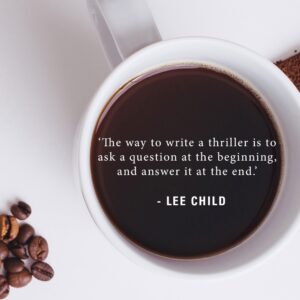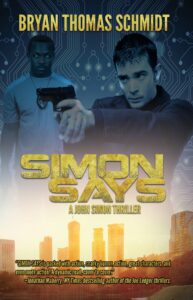 This week as I launch my latest novel, and my first thriller, Simon Says, I wanted to talk about the importance of suspense to drive a story. But before I get into how to make a story suspenseful, it’s important we first talk about Plot, because plot drives suspense, and the core of any good plot are questions asked and answered.
This week as I launch my latest novel, and my first thriller, Simon Says, I wanted to talk about the importance of suspense to drive a story. But before I get into how to make a story suspenseful, it’s important we first talk about Plot, because plot drives suspense, and the core of any good plot are questions asked and answered.
In Writing The Breakout Novel, Donald Maass identifies Five Basic Plot Elements all plots must have. They are:
- A sympathetic character.
- Conflict.
- Complication.
- Climax.
- Resolution
So every good plot starts with character, specifically a character we can care about. Then that character encounters obstacles that create conflict. This can be another person or group of people, some natural or other issue, etc. Then the conflict is complicated by various other obstacles and barriers that stand in the way of the character resolving it. This leads to a climax wherein the character must confront the opponent—person, animal, or thing—head on and see who will win. This leads to a resolution. These five elements make up any solid, well developed plot.
 Once you have these core elements, plot is driven by asking questions. But what makes readers keep turning the pages isn’t just the questions themselves but how and when you answer them. Some questions get answered in the same scene, some several scenes later but within the same chapter. Some questions get asked and go unanswered for many chapters or even the entire book. The weight in importance of the question usually determines how long you will take to answer it and whether you answer it in pieces or all at once. Asking intriguing questions that readers just have to know the answers to will keep them interested and compelled as they continue to read. So picking the right questions is vital.
Once you have these core elements, plot is driven by asking questions. But what makes readers keep turning the pages isn’t just the questions themselves but how and when you answer them. Some questions get answered in the same scene, some several scenes later but within the same chapter. Some questions get asked and go unanswered for many chapters or even the entire book. The weight in importance of the question usually determines how long you will take to answer it and whether you answer it in pieces or all at once. Asking intriguing questions that readers just have to know the answers to will keep them interested and compelled as they continue to read. So picking the right questions is vital.
Questions can derive from characters or conflict. They result in complications that lead to a climax or climactic confrontation and then to a resolution (unless you have a sequel and end on a cliffhanger of sorts). The questions need to be compelling but they don’t always have to be complex or deep—just something we care about the answer to. At different points in the story, our level of caring will vary. At the beginning, it takes a while to care about the characters, so while you may ask big questions that set up the story and drive the characters (and won’t be answered until the end), the full weight of them isn’t felt right away. We may be intrigued, but to make us “dying to know” we need to care about the outcome, and that means caring about the characters: what they want, who they are, what their goals are. So, as you can see, all the five core elements of plot play into the power of storytelling. It’s very important to pick the right ones: ones that will generate compelling and interesting questions that keep readers coming back for more.
For example, some things we will want to know in a good story are: Who is this character? What does this character want? How is what this character wants affected by what other characters want? Why does any of it matter? Where does the story take place? When does the story take place? How is this character like me? How is this character not like me? What is this clue or object? Who has it? Who wants it? Why does it matter? What is the effect of one character having it over another? And so on.
The result of this pattern of questions and when and how you answer them is suspense—the tension that drives the story and compels us to keep reading to see how it turns out. Asking the right questions at the right time and answering them at the right time builds tension and keeps a story interesting and well-paced. Asking the wrong questions and answering too soon or not well (or not at all) destroys tension and interest and leads readers to stop reading or even throw your book against a wall in sheer disgust. So you see: the first key to good plotting is asking the right questions at the right time. The second key to good plotting is answering them at the right time in the right way.
Also key is viewpoint. Because picking the right viewpoint affects what we know and what we don’t know and how much we care about finding the answers. The question to ask yourself in choosing viewpoint is which character is the best person to tell this story or scene? In the case of singular viewpoints, everything readers learn will be what one character learns or knows, solely their experience and interpretation of people and events. With multiple narrators, you must choose who has the most to lose. Usually that character is the best one to tell a particular scene because their stakes are the highest. And as such, their questions and needs will be the most compelling and interesting for readers.
In next week’s post, we will examine techniques for building tension and suspense. The goal is to help you make your stories more compelling so readers come back for more and more.
 In the meantime, if you want to see what I am talking about, perhaps check out my new novel, Simon Says, which I mentioned earlier. Readers tell me it is a real pageturner because of the suspense. The editor was so hooked he forgot to edit and kept having to go back and reread to do his edits. Free sample chapters can be found here.
In the meantime, if you want to see what I am talking about, perhaps check out my new novel, Simon Says, which I mentioned earlier. Readers tell me it is a real pageturner because of the suspense. The editor was so hooked he forgot to edit and kept having to go back and reread to do his edits. Free sample chapters can be found here.
Thanks for reading this far. Good luck with those questions. See you next week when we talk about how to play off them for greatest effect.

One thought on “WriteTip: The Key to Good Plotting—Asking The Right Questions at The Right Time”
Comments are closed.